Psychological Profiles for the Cups Court Cards with Archetype Examples + Emotion Regulation Spread (Podcast Ep. 62 blog)
05May
💰Paypal Tip Jar
This blog goes along with Healing Thru Tarot Podcast Ep. 62: Psychological Profiles for the Cups Court Cards with Archetype Examples + Emotion Regulation Spread
In this blog, I’ve constructed psychological profiles for each of the court cards in the cups suit including positive and negative personality traits and a list of psychological conditions I think would be most prominent with this suit. These profiles will help us understand these court cards at a deeper level. And I’ll share a spread I created that was inspired by the traits and characteristics of the cups suit. This is the last blog in this 4 part psychological profile series. Check out the blogs and podcast episodes for the rest of the profiles of all the tarot suits – episodes 56 (Swords court cards), 58 (Pentacles court cards) and 60 (Wands court cards).
Today, we are focusing on the suit of cups since this is the suit associated with the summer months, which are approaching quickly. The suit of Cups represents not only summer but also the element of water, which is related to the zodiac signs Pisces, Cancer, and Scorpio. So, if your sun, moon, or ascendant signs is a water sign, one of these court cards is your tarot signifier card.
Best Tarot Court Resource
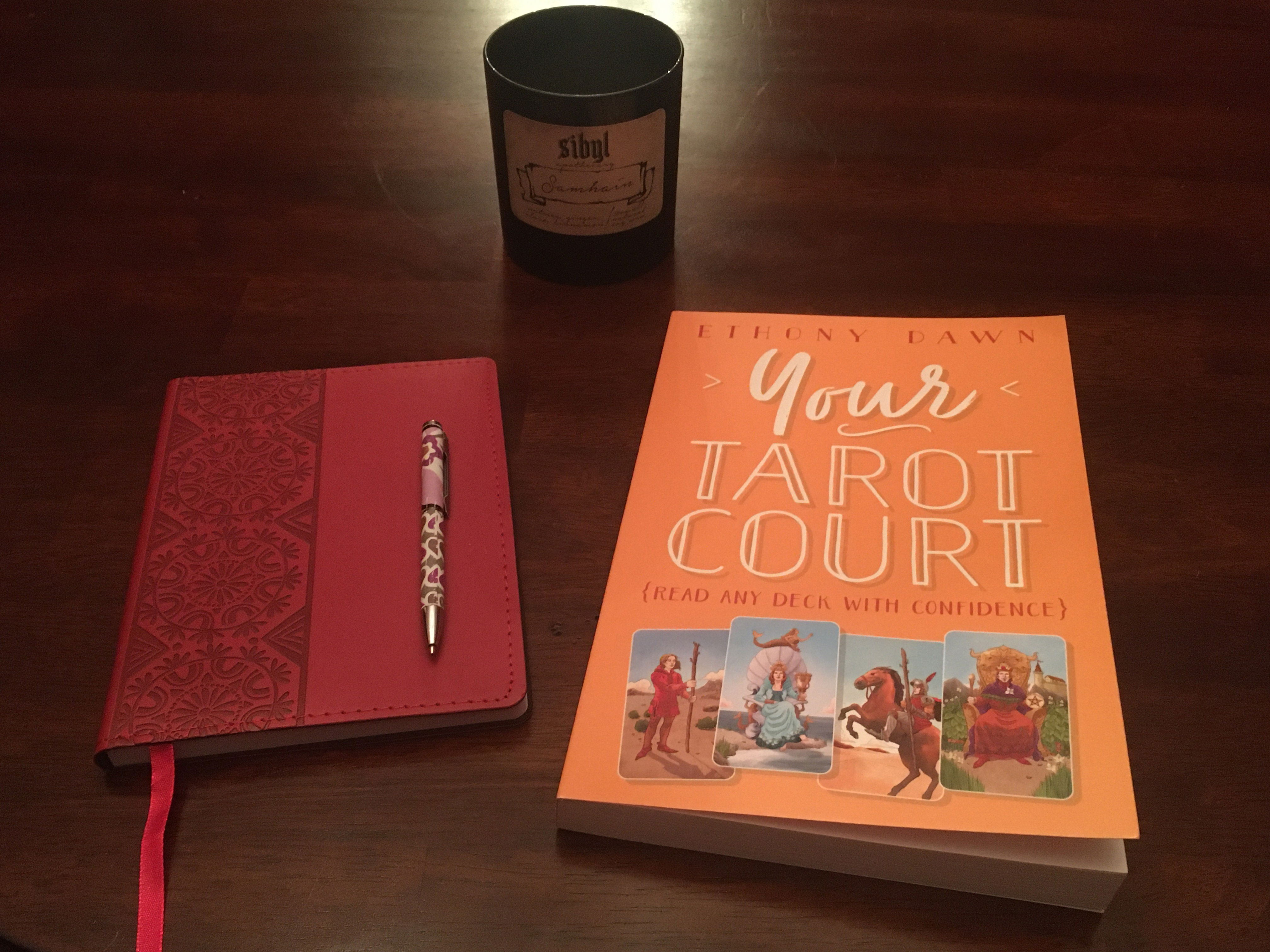
I’ll be drawing some information and examples from my favorite book on the tarot court cards – Your Tarot Court by Ethony Dawn. And I’ll add my own examples of these personalities given my experience as a clinical psychologist who assesses, diagnoses, and treats psychological and personality disorders. Let’s dive in and start with the Page of Cups and work our way up to the King of Cups.
Page of Cups Psych Profile and Traits
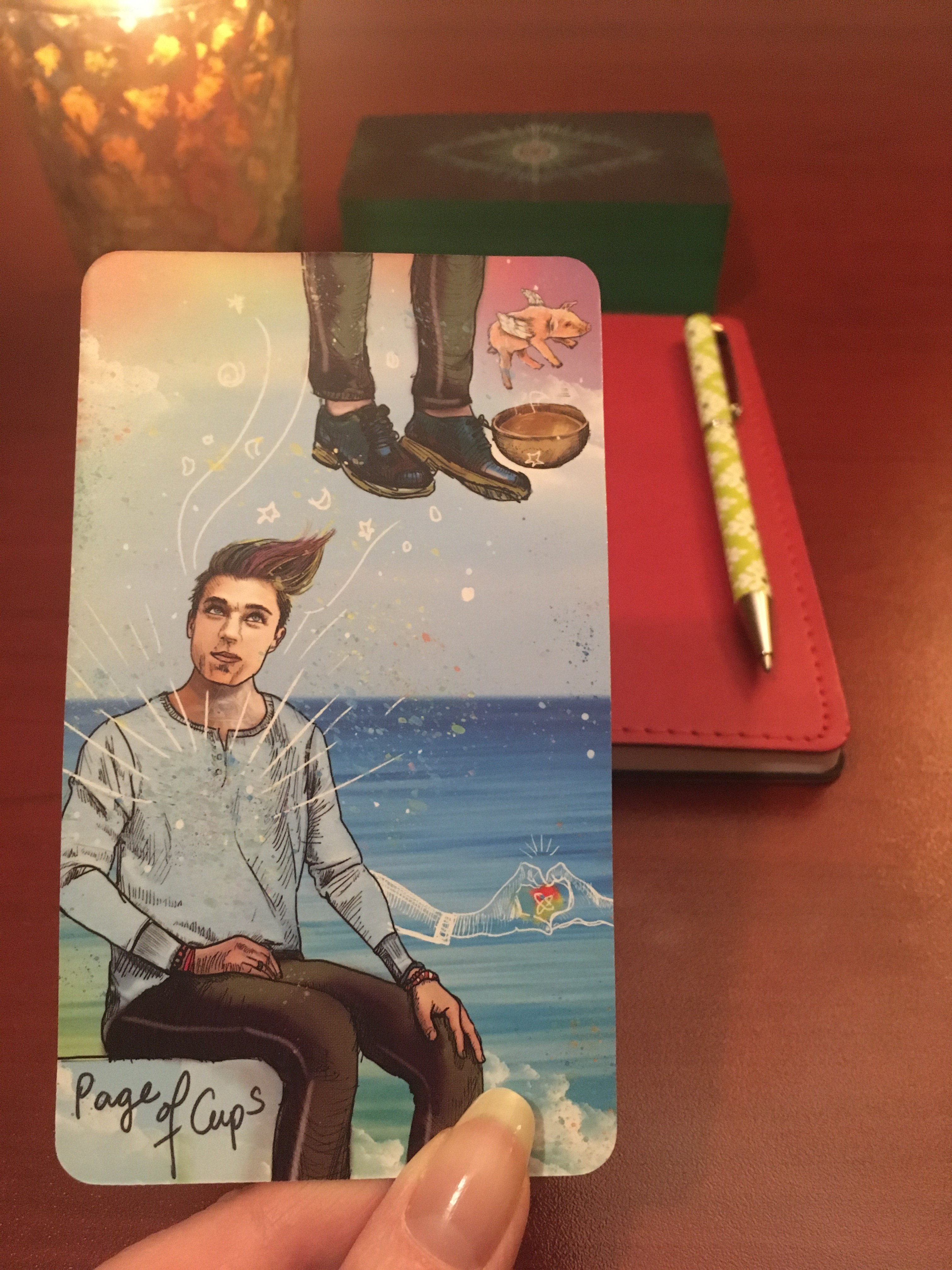
The Page of Cups could be any of the 3 water signs for ages 11 and under and is the Empath archetype, according to Ethony. They’re extremely sensitive, highly intuitive, and wear their heart on their sleeve. Given that they absorb energy from those around them, their moods may shift drastically. Setting firm boundaries and grounding would be vital to protect their energy and balance it. They will require more time to recharge at home after being social. Being a water sign, this page is connected to all bodies of water, using water to recharge and cleanse their energy.
Ideal Professions for Page of Cups
When it comes to work, the Page of Cups is drawn to the arts. As natural artists, they tend to drift without direction and start a lot of creative projects that they don't finish, so they may need to be reined in and require help with implementing structure for their work routines to keep them on track. Ethony points out that the Page of Cups would do better in a small business or working from home versus working for a large corporation where the environment is just too overwhelming. They're better off surrounded by other creatives who understand their imaginative minds. Their strong empathic gifts often bloom in childhood, allowing them to read others easily. And they thrive when their family and partners understand their gifts and support their talents.
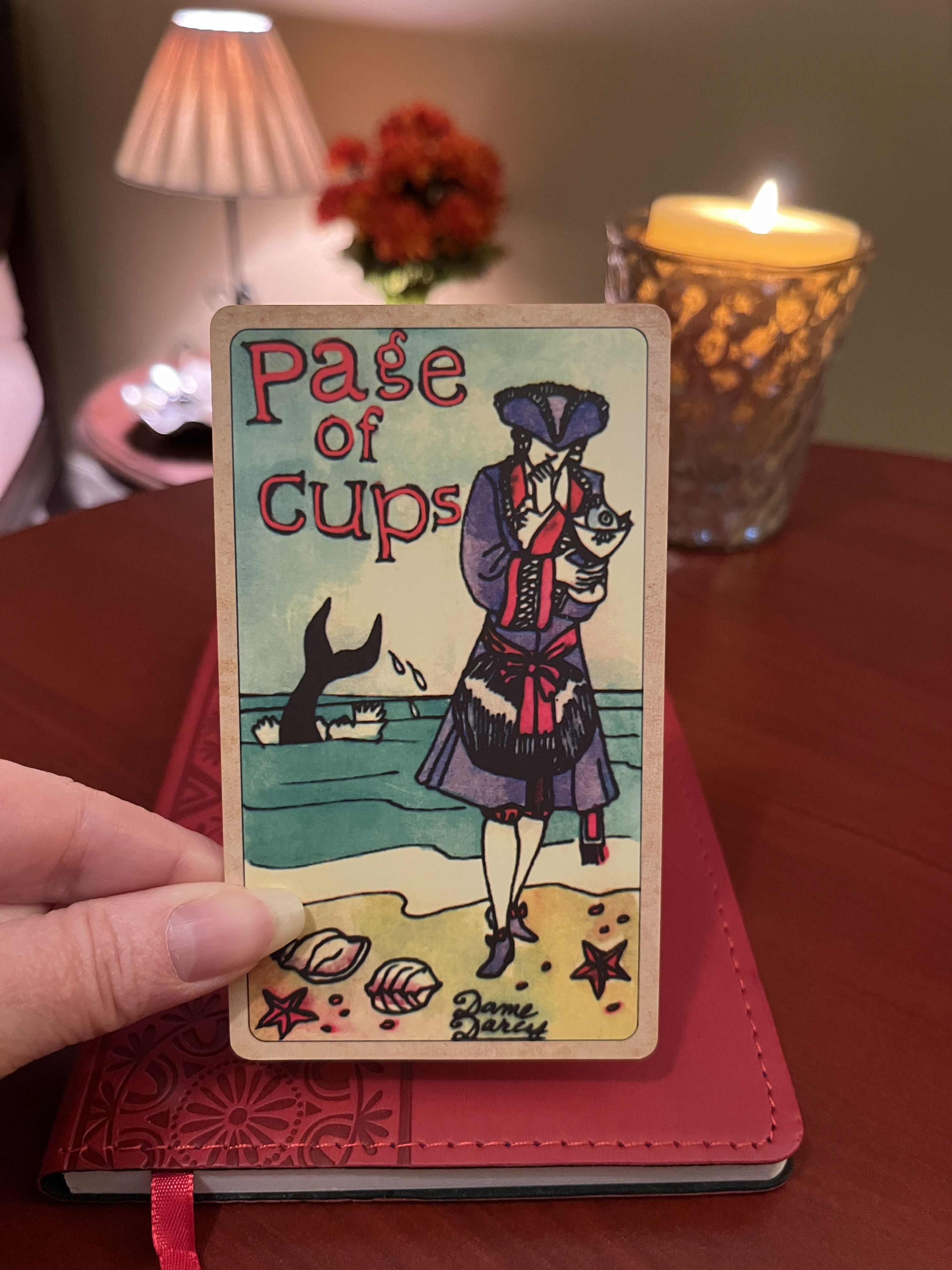
In the shadow, they will sulk when they don't get their way, can be unsure of their identity outside of a relationship, and struggle with coping due to the overwhelming pain of this dense world. When overwhelmed, they seek to escape, which can lead to addiction, especially alcoholism given that this is the cups suit. They often blame others for their faults instead of holding themselves accountable. They often find themselves in codependent relationships because they deeply need the security of another person in their life to anchor them and they'll seek approval and constant reassurance that they are loved back.
Examples of the Page of Cups Empath archetype would be Phoebe Hallowell from Charmed, Rogue in Xmen, and I also think of the Mad Hatter in Alice in Wonderland who is highly imaginative, warm, and inviting, and shows a great deal of empathy when having heartfelt conversations to connect deeply with those around him.
The Knight of Cups Psych Profile and Traits
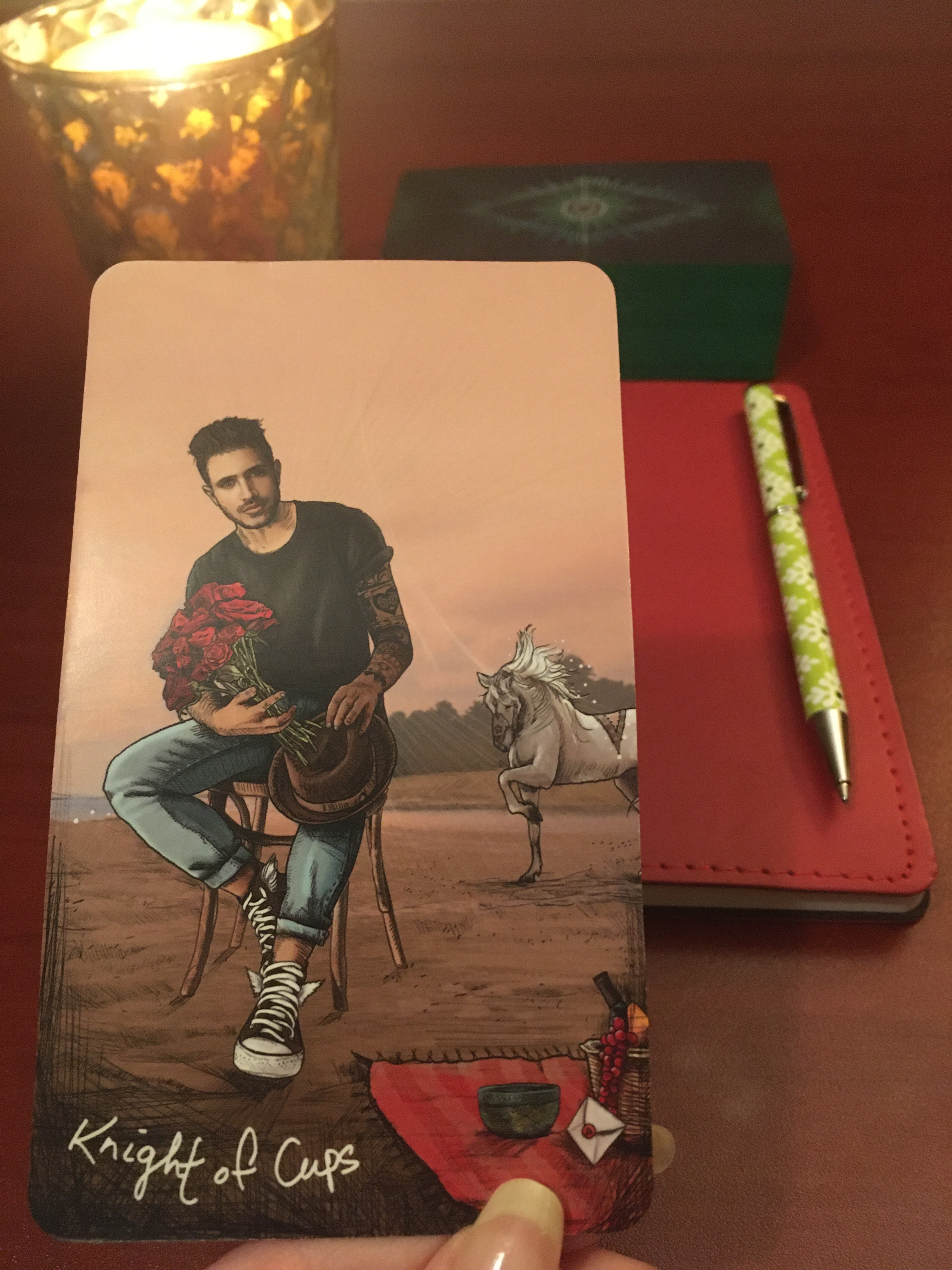
The Knight of Cups is the Romantic archetype and is associated with the sign of Pisces and represents ages 12-21. This knight is passionate, emotional, artistic, expressive, and charming. Ethony calls them the “sensitive idealist.” They are completely swept up in romance and always have love on the brain. They’re the dreamers of the court cards. I always think of them as the poets, serenading others with their prose. Like, Spike from Buffy the Vampire Slayer, who was a shy, romantic poet before he turned into the brooding vampire that we love to root for. This knight is introspective, feels deeply, and can be easily wounded by those they love.
In the shadow, when wounded, they can strike back with harsh words. So beware. They’re often casting themselves as the rescuer as it fills that great desire to feel needed. If they’re blocked from channeling all their creative energy into something meaningful, they could fill that void with an unhealthy habit or addiction. They're always chasing something out of their grasp; whether it be their soul mate or their wildest dreams. The problem is that they’re not very committed in reality. It’s the chase they love because it’s thrilling. They leave a trail of broken hearts behind them just like Casanova.
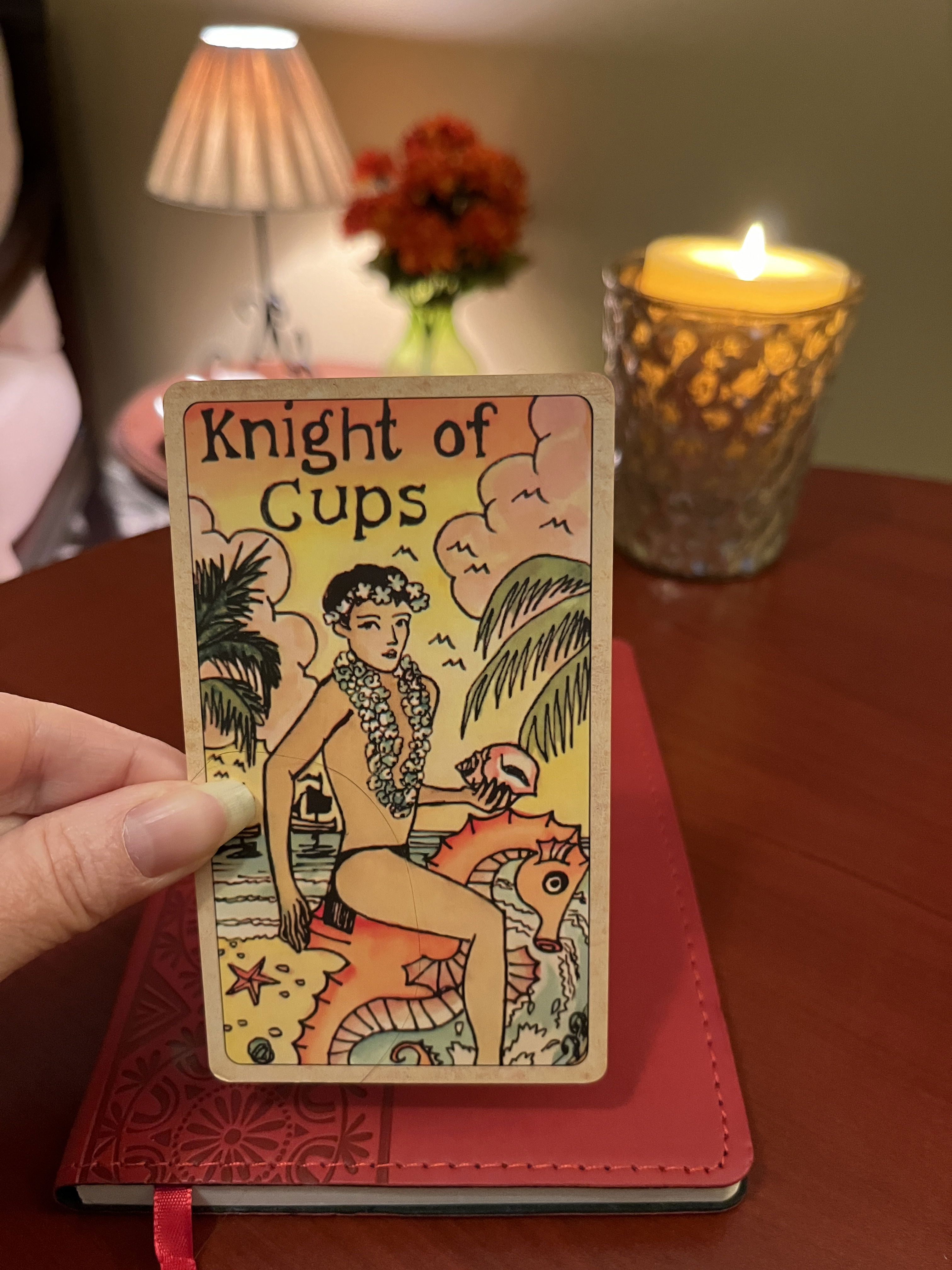
Ideal Professions for Knight of Cups
When it comes to work, it’s vital that they do what they’re passionate about, finding a way to tap into the full potential of their gifts and talents. They become easily frustrated when things aren’t flowing, so they work best in positions where their creativity is uninterrupted and appreciated and when part of a creative team. Otherwise, it might be best to work for themselves. BUT they may need someone else to keep them motivated or to outsource tedious tasks to, especially with the accounting and sales part of their business.
Examples of the Knight of Cups Romantic archetype would of course be Romeo, Don Juan, Prince Charming, Charlie in Heartstopper as the young eager romantic, and Christian in Moulin Rouge who woos Satin with his poetry and beautiful song lyrics.
The Queen of Cups Psych Profile and Traits
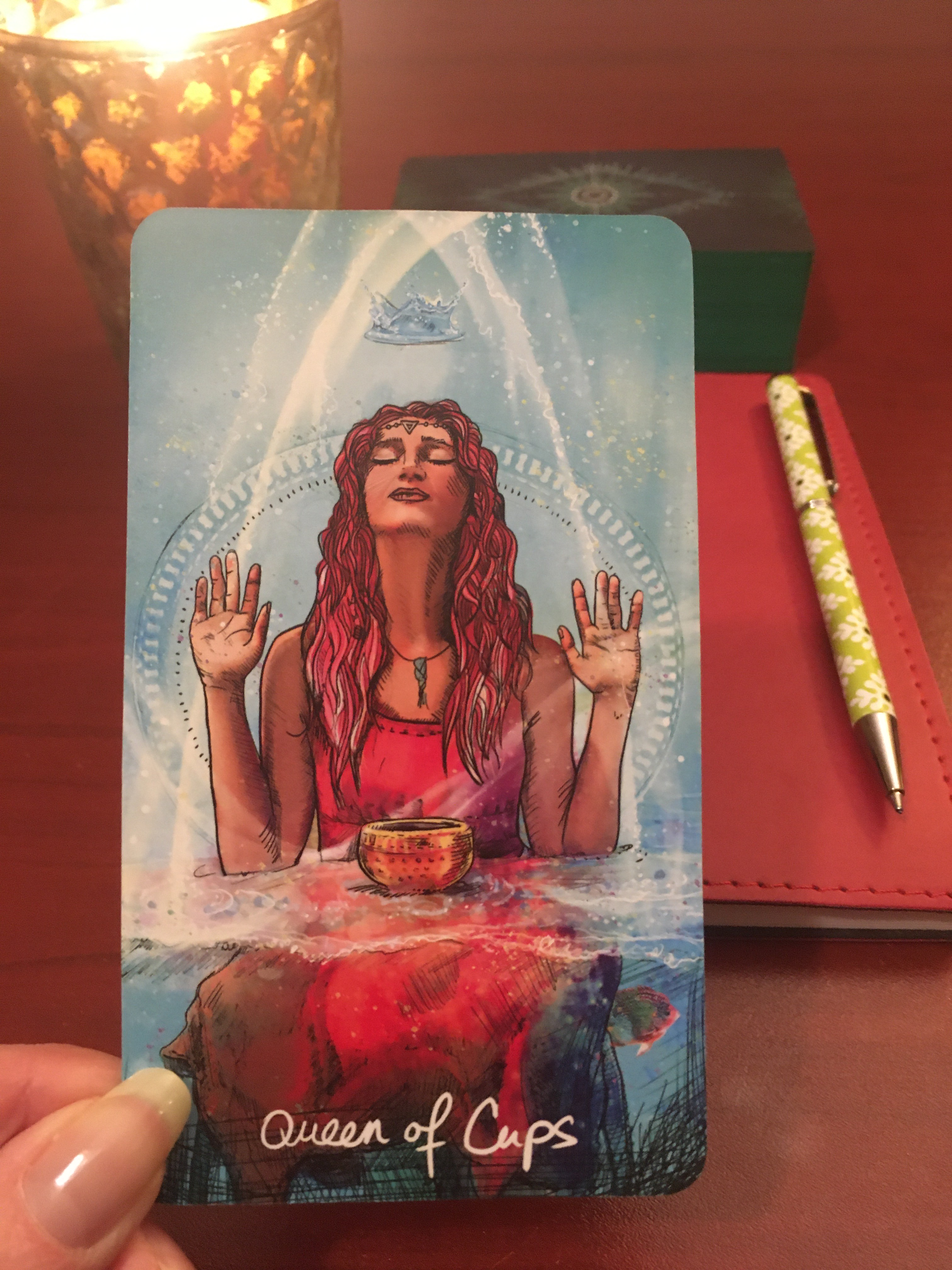
The Queen of Cups is the Mystic archetype related to the zodiac sign of Cancer. This queen is sensitive, intuitive, loving, and psychic. She’s also mysterious, deep, and a natural healer who uses their gifts to heal others and help those around them connect with their own intuitive abilities. They’re drawn to spiritual paths from an early age, spending most of their time straddling this realm and the spiritual realm. They’re often drawn to mystical items and practices such as tarot, crystals, astrology, and reiki healing. They’re very maternal and nurture all children even those that are not their own. They’re warm, loving, and devoted to their partners. They're deeply romantic and a natural caretaker, but they often put themselves last since they're too busy taking care of everyone else's needs.
Ideal Professions for Queen of Cups
For work, they thrive in areas of healing such as emotional, intuitive, and energetic healing. Since they’re naturally artistic, creative, and drawn to beauty of all kinds, you’ll find them in museums, theaters, schools, and art studios all around the world. They desire to use their gifts for the greater good, so they would be attracted to the areas of personal development, spiritual counseling, supportive healing practices, and working with children. They’re deeply connected to their emotions and use their intuition as a guide in everything they do. They easily connect with others and can read others effortlessly, which is why they make excellent tarot readers and psychics. They’re highly in tune with the needs of others, and speak from the heart, so anything related to humanitarianism and service to others would be excellent areas for them to pursue.
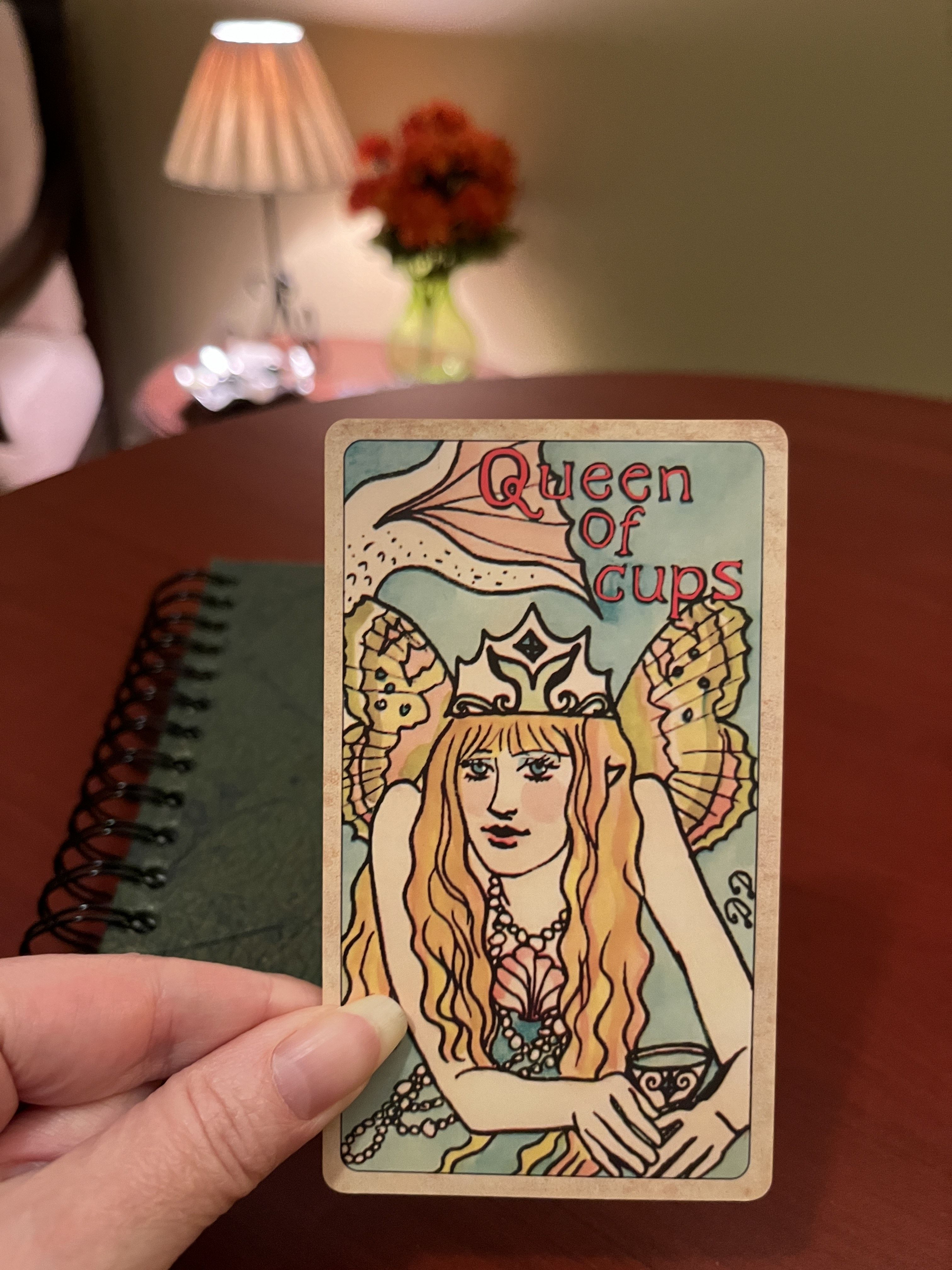
In the shadow, they’re flaky, fearful of mistreatment from others, ungrounded, emotionally guarded, and disconnected from reality. They can be quite overprotective and overbearing if they haven’t done enough spiritual work on themselves. They’ll often use tears to get what they want as they’re masters of emotional manipulation. And they’re often attracted to people who are wounded and in need of healing, creating a codependent relationship.
Examples of the Queen of Cups Mystic archetype would be: The Oracle in the Matrix, Professor Trelawny from Harry Potter, Esme and Aunt Polly on Peaky Blinders, Doctor Strange, and Vanessa Ives on Penny Dreadful. Klaus Hargreeves from the Umbrella Academy is also a great example of the mystic as he has tattoos on his hands saying hello and goodbye given that he’s a human Ouija board.
The King of Cups Psych Profile and Traits
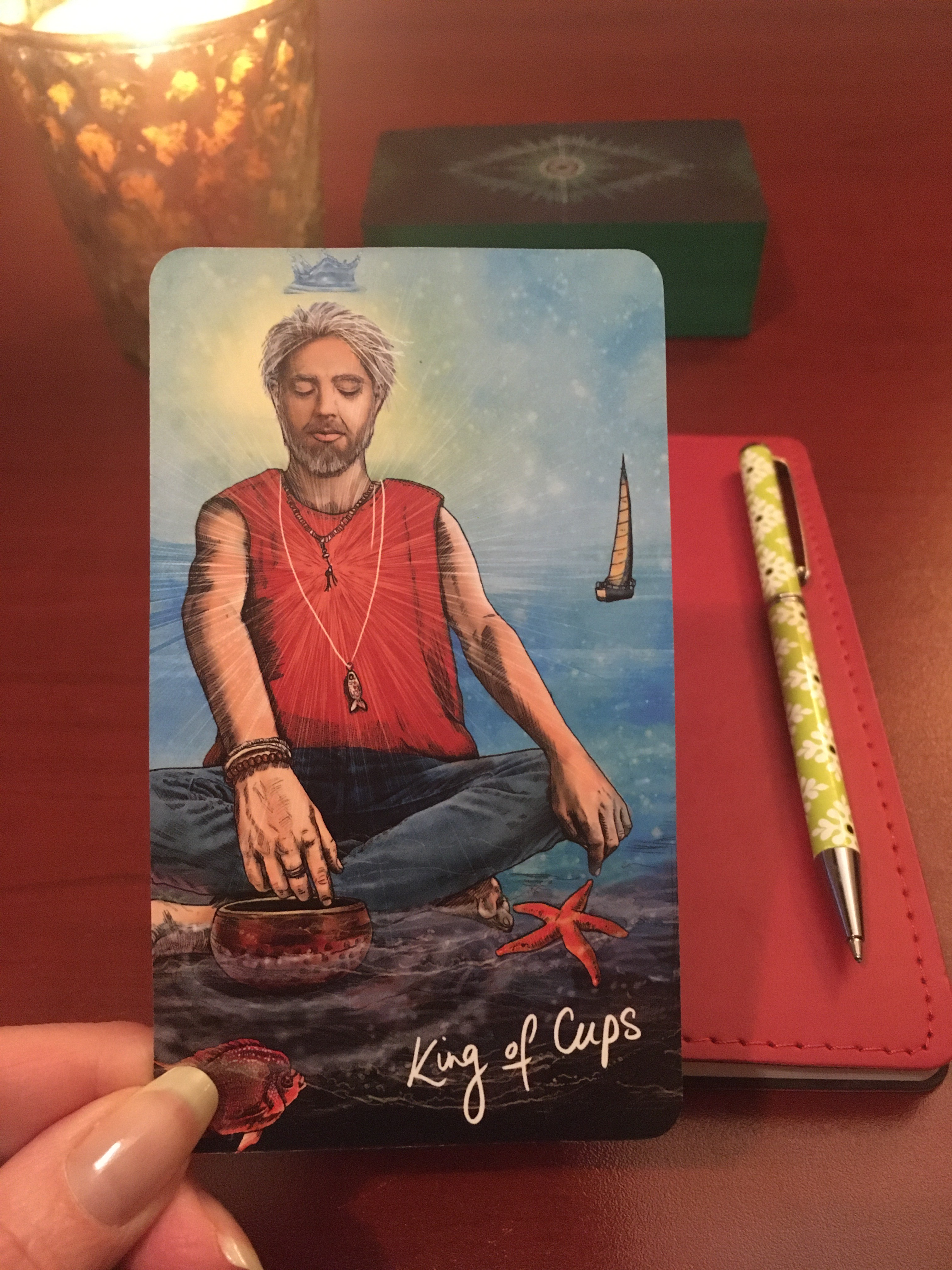
And lastly, we arrive at the King of Cups, which is the archetype of Hades, Lord of the subconscious and the underworld, according to Ethony. He’s associated with the Zodiac sign of Scorpio. This king is thoughtful, connected, sexual, and deep. They can be very generous, compassionate, and cultured. They’re aware of their dark side and have embraced it after going through their dark night of the soul and major shadow work, finding a way to incorporate their darker aspects into their psyche. But since they’re so comfortable with their dark side, others may find them intimidating and intense.
Ideal Professions for King of Cups
At work, the King of Cups is drawn to any position where they can influence people, seeking positions like ministers, religious leaders, motivational speakers, and salespeople (often conmen in the shadow). Being a water sign, they’re also drawn to bodies of water, so jobs such as sailors, fishermen, surfers, and marine biologists would suit them well. They will also be drawn to working with the fields of medicine, including nursing and psychology, especially sex therapy, grief therapy, and end of life counseling. Given the connection that Scorpio has to the death card in tarot, they have a healthy relationship with death. Thus, hospice care, undertakers, funeral directors, and coroners would also be in their wheelhouse.
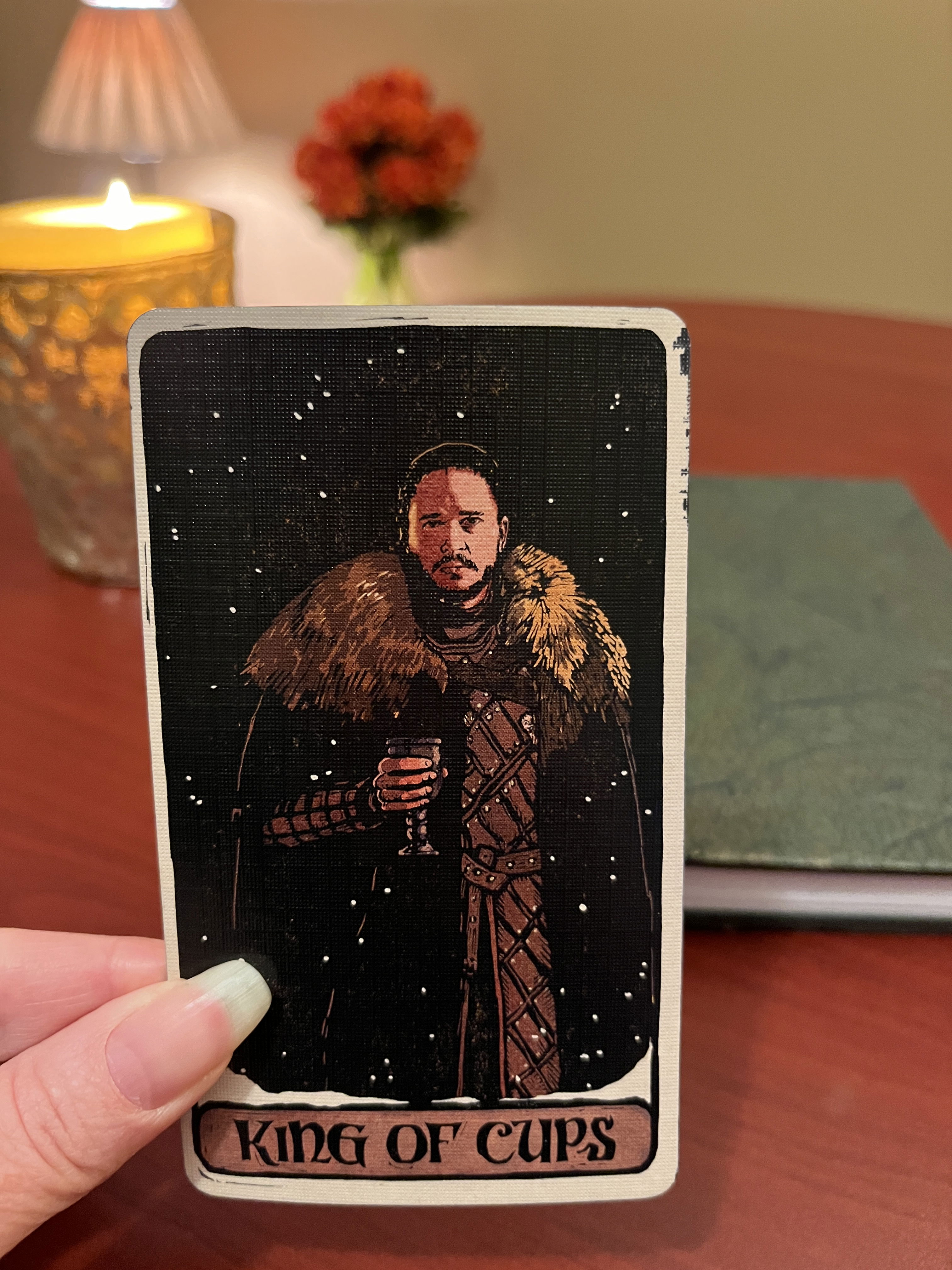
In relationships, they’re very intense and loyal partners, only wanting to be with someone they have a deep connection with sexually and emotionally. They fall deeply and madly in love, which can be intoxicating to others drawn to their intensity. But many can’t handle it for long, finding their sharp tongue and cruel honestly too much to take.
In the shadow, they’re abusive, codependent, and can gaslight others or blackmail others. They have a tendency to deal with their emotions in unhealthy ways, especially drinking excessively. They might come off as charming, but seduction is one of their tools to manipulate others. They’re also destructive, dark, moody, prone to addictions, and they’ll project their emotions onto others. On the other side of the continuum, some may be completely withdrawn, shut down, and brooding. They can easily get lost in their own emotions, and if betrayed, it’s impossible for them to forget or trust again.
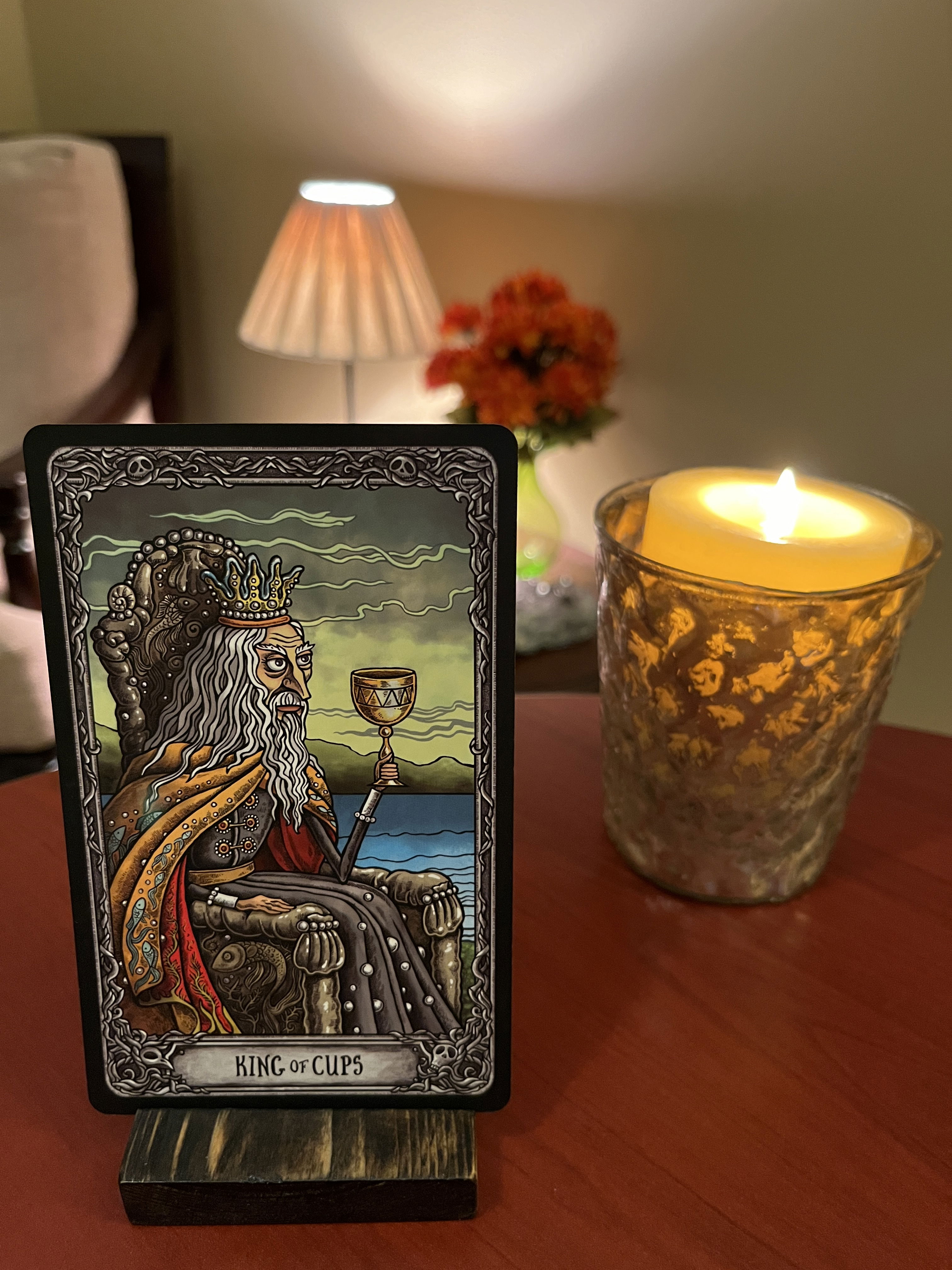
Ethony gives these examples for the King of Cups Hades archetype, Snape from Harry Potter, Batman, and Aragorn from The Lord of the Rings, as they all walk the line of the darkness within. I thought of Beth Dunn from Yellowstone. She’s dark, cynical, deeply wounded, and drinks like a fish. She only lets 2 people close to her – her father and Rip, her high school boyfriend. But it took years for them even to break through her layers of grief and guilt related to her mother’s death and trauma stemming from a botched abortion when she was a teen. She’s a complicated mess, but we love her for all she’s overcome.
And as a Scorpio, Wednesday Addams belongs here. She’s mysterious, secretive, cynical, and she dances with the dark as an intensely moody and sadistic teen with a wickedly dark sense of humor.
Psychological Conditions Prominent with The Cups Court Cards
Of course, any personality type could be diagnosed with any of these suits BUT given their personality traits and their approaches to life, work, and relationships, I think there are certain conditions that are prominent among the cups suit. Even if you identify with some of what we’re talking about today, that doesn’t mean you’d fit the full criteria for any of these disorders. We all have some degree of some of these traits.
To be considered a disorder it must interfere with the individual’s day-to-day functioning or cause the individual significant distress across many areas of their life. This discussion is just to help give you a clear picture of these distinct personalities to help you keep these court cards separated in your mind.
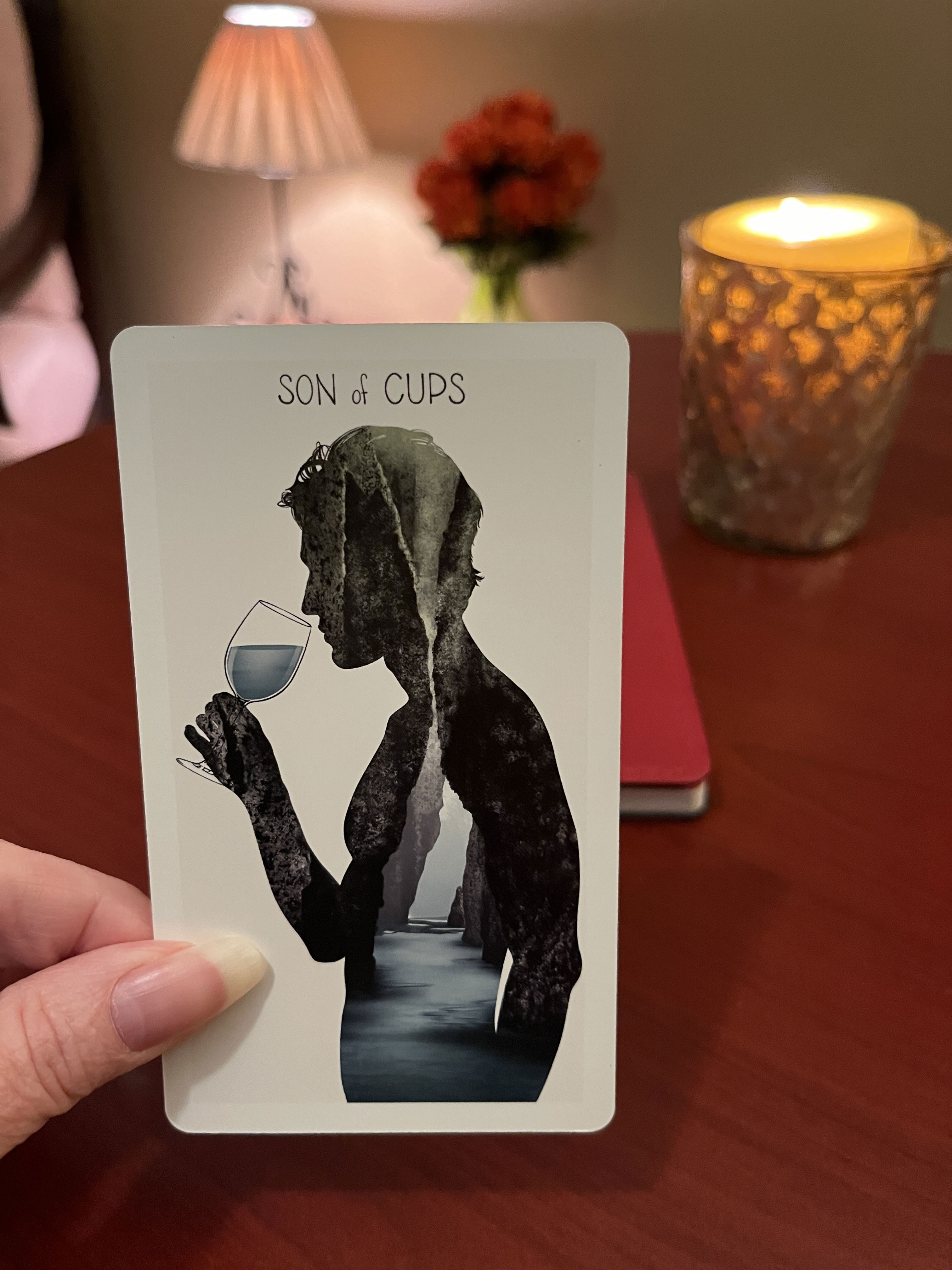
I’ve assigned these disorders to the cups suit based on how I view them using my experience in clinical psychology for the past twenty years.
I focused on issues related to addiction, relationships, emotions, and mood when assigning disorders to the cups suit. Given that the cups suit relates to our emotions, mood disorders are key here, including bipolar and depressive disorders.
Once known as manic-depressive disorder, Bipolar Disorder involves a shift between intense emotional states that typically occur during distinct periods of days to weeks, called mood episodes, categorized as hypomanic, manic, or depressive.
A manic episode is a period of at least one week when a person is extremely high-spirited or irritable most of the time for most days where they possess more energy than usual and could include a decreased need for sleep, rapid speech, racing thoughts, increased activity such as restlessness, working on several projects at once, or increased risky behaviors including things like reckless driving and spending sprees. It must represent a change from the person’s usual behavior and be severe enough to cause dysfunction in work, relationships, social activities, and responsibilities. Bipolar disorder has 3 types: bipolar I, bipolar II, and cyclothymic disorder. Each category depends on the severity of the mood cycles and how rapid the cycling occurs.
Individuals with bipolar may swing from manic episodes to major depressive episodes which can last for at least 2 weeks and include intense sadness or despair, loss of interest in activities they once enjoyed, fatigue, feelings of worthlessness, increased or decreased sleep, change in appetite, and suicidal thoughts. Individuals just experiencing depressive symptoms without any mania could meet criteria for depressive disorders, which would also fall in the cups suit.
Think of the 5 of Cups card that represents despair, loss, regret, disappointment, and sorrow, and the 4 of Cups which symbolizes dissatisfaction and a lack of motivation.
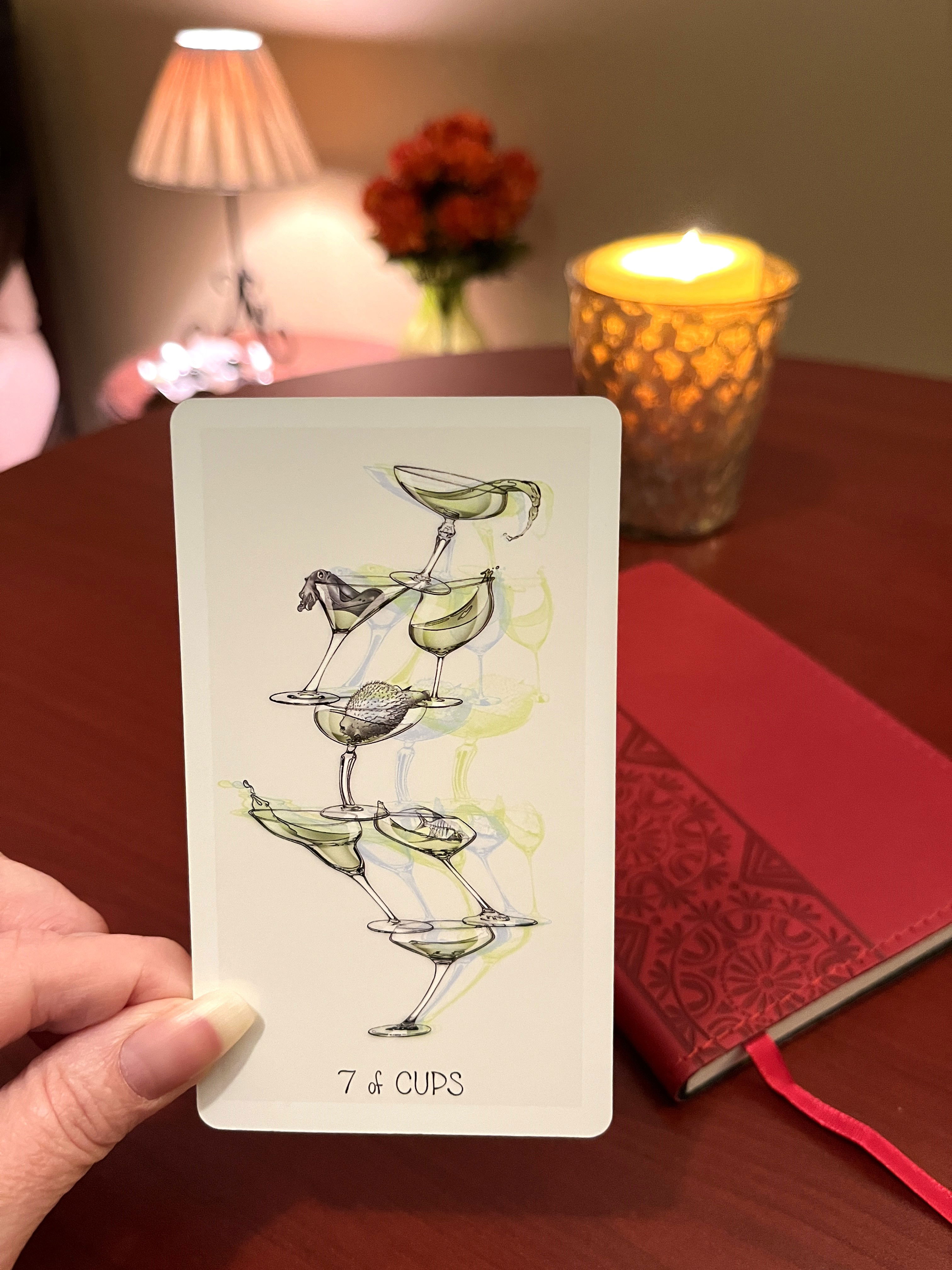
Some individuals drown themselves in alcohol when they feel depressed or unhappy so I’m adding alcoholism and all types of substance abuse and dependence here. Whenever I see a group of cups cards grouped together, I think of substance abuse, like when I see the 7 of Cups, 3 of Cups, 9 of Cups, Ace of Cups, Knight of Cups, and King of Cups in one spread, especially if they are combined with the Devil card, representing addictions, or Temperance, which calls for moderation. In these situations, I’m viewing the cups as literal cups full of alcohol that the person is ingesting.
Given that the Page of Cups and 7 of Cups can represent an element of delusional thinking and hallucinations, psychotic disorders such as schizophrenia, paranoid disorder, delusional disorder, and paranoid personality disorder could occur. These are the disorders that we classify as out of contact with reality. In the Rider Waite Smith version of the Page of Cups, the page is conversing with a fish in his cup, which symbolizes psychosis to me.
Paranoid personality disorder (PPD) is a mental disorder characterized by paranoia, a pervasive suspiciousness, and generalized mistrust of others. Fearing they are in danger, they interpret events in their life as threats and hostile actions against them, which often causes them to withdraw from society. A disorder that may develop in people with a paranoid personality disorder could be Delusional Disorder, which is characterized by one or more firmly held false beliefs that persist for at least 1 month. The false beliefs may be ordinary things that could occur (such as being deceived by a spouse, being followed, poisoned, or infected) or things unlikely to occur (such as having internal organs removed without leaving a scar). The difference between a delusion and a false belief is that people continue to believe in a delusion no matter how much clear evidence contradicts it. Delusional disorder is distinguished from schizophrenia by the presence of delusions without any of the other symptoms of psychosis (for example, hallucinations, disorganized speech, or disorganized behavior).
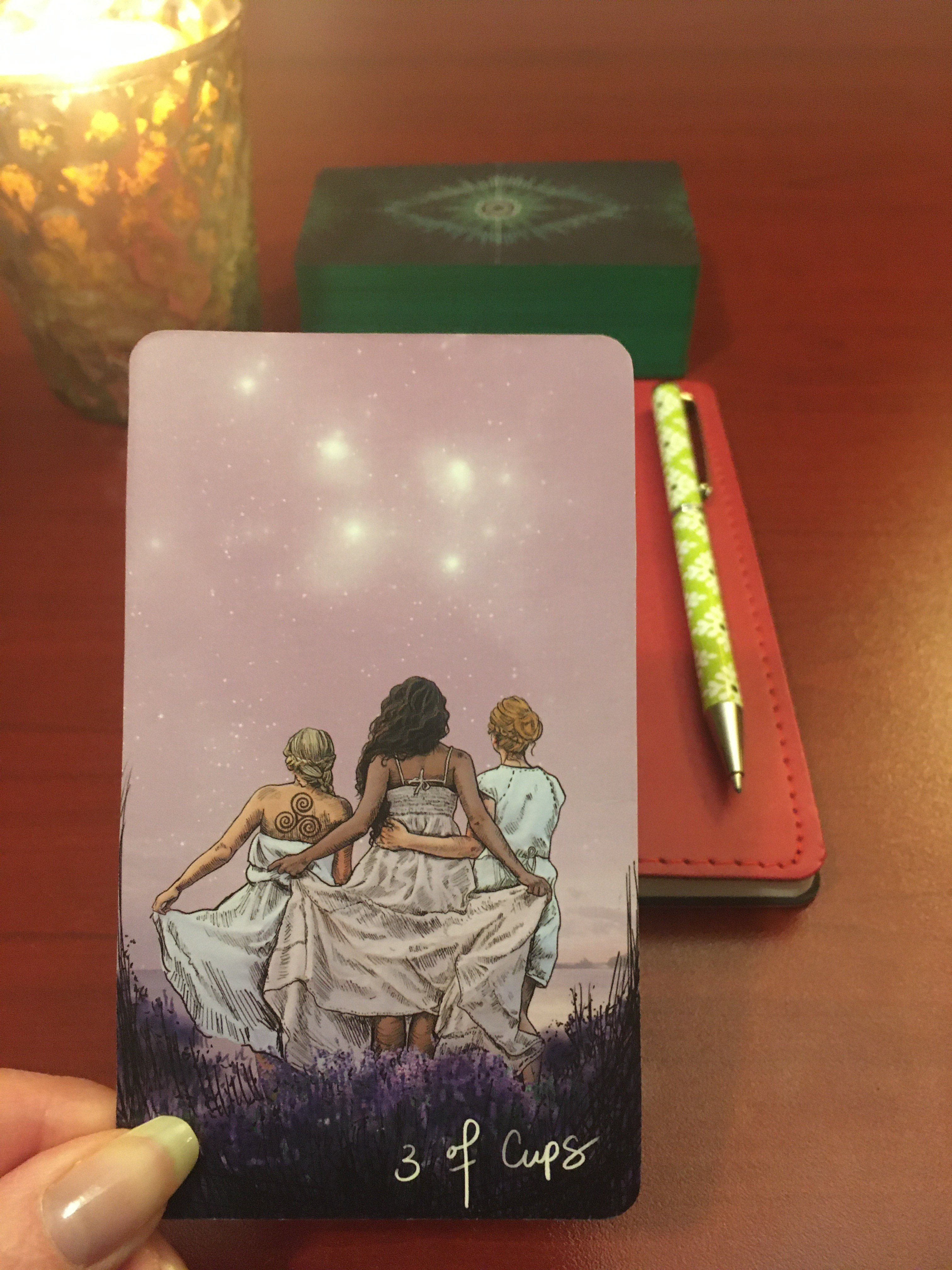
Since the cups suit deals with relationships, this is a very social suit, so we can look at Avoidant Personality Disorder and Social Anxiety Disorder. Avoidant Personality Disorder is marked by strong feelings of social inadequacy and fear of rejection leading to withdrawal, detachment, and extreme anxiety across every aspect of their life. They may even display an avoidance of any work that requires social contact out of a fear that others will criticize or reject them. While there are seemingly some similarities with this disorder and Schizoid Personality disorder, the difference between the two is that the motivation for people with Avoidant Personality is fear of humiliation, or rejection while the motivation for people with Schizoid is a lack of desire for social relationships.
So even though they are detached, those with avoidant personality want to be accepted and to have close relationships. And that lack of attachment causes them great emotional pain. While both Avoidant Personality and Social Anxiety are marked by the fear of scrutiny or ridicule in social situations, those with social anxiety disorder may still engage in social situations. It may cause them intense anxiety, but they may still push themselves to try to attend social engagements. While those with avoidant personality avoid social activities or relationships where they risk embarrassment. Fortunately, learning coping skills through psychotherapy and anti-anxiety medications can help those with social anxiety gain confidence and improve their ability to interact with others unlike personality disorders, which are chronic.
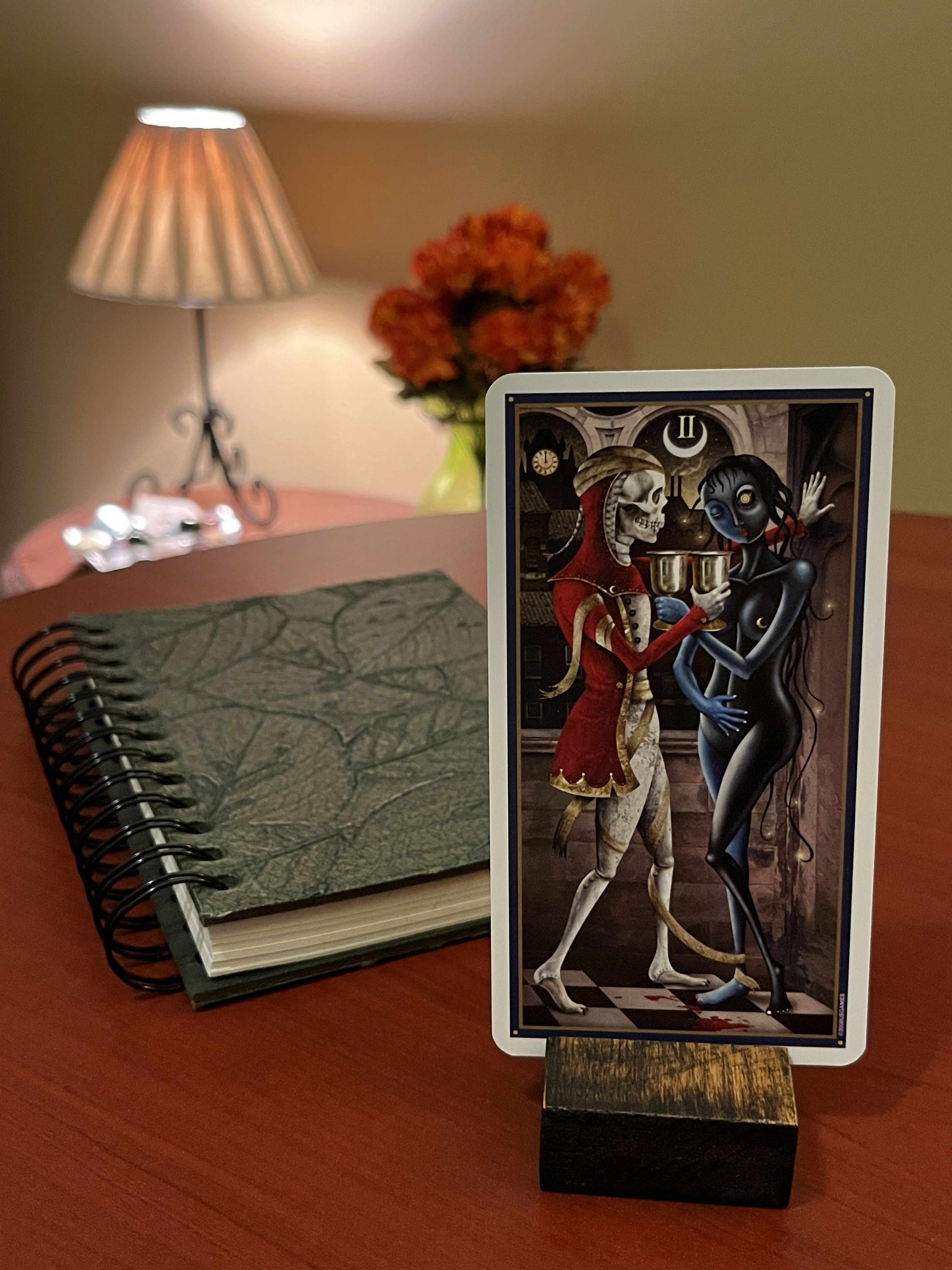
In relationships, those in the cups court cards, can fall into co-dependent relationships. There will be some degree of dependency even in healthy relationships. However, there are times when dependency goes beyond the norm, leading to an individual becoming unable to care for their own needs without help. There are also times when a person who has a desire to feel needed might sacrifice their own needs in an effort to care for another person in their life.
Codependency itself is not a disorder; it is a behavior. But there is a personality disorder called Dependent Personality Disorder (DPD) that is characterized by neediness and reliance on others, anxiety and fear stemming from the idea of separation, not wanting to be alone, fear of disapproval from a partner, depending on the other person to make decisions for them, even small daily decisions, and a lack of independence, accountability, and responsibility in most areas of life. A codependent person depends on another person needing them, while a person with Dependent Personality Disorder is dependent on the care provided by another person. The individual’s sense of self is skewed in both conditions, preventing personal growth and healthy development inside and outside of the relationship.
We might also see childhood attachment disorders here such as Separation Anxiety and Reactive Attachment Disorder.
Separation Anxiety Disorder involves the developmentally inappropriate and excessive fear or anxiety concerning separation from those to whom the individual is attached, including excessive distress when anticipating or experiencing separation from home or from major attachment figures. This can include excessive worry about getting lost, being kidnapped, or having an accident or illness that that causes separation from a parent or caregiver.
On the other extreme, we have Reactive Attachment Disorder where the child rarely turns to the caregiver or parent for comfort, support, or protection; doesn’t respond to their comforting efforts; and has a diminished or absent expression of positive emotions during interactions with caregivers.
So, in summary, I’d say that we could see these diagnosable conditions with the cups suit: mood disorders like bipolar and depression, social anxiety, alcoholism and other substance abuse disorders, separation anxiety, reactive attachment disorder, paranoid and delusional psychotic disorders, including schizophrenia, and personality disorders like dependent personality, avoidant personality and paranoid personality disorder.
I’m sure there may be others, but these were the ones that I associate most with the court cards in the cups suit. If you’ve enjoyed this discussion of the personality profiles of the cups court cards, I highly recommend Ethony Dawn’s book - Your Tarot Court. It has helped me immensely over the years to see the court cards in these distinct personalities, which helps make my readings so much clearer.

So that concludes our travels through all 4 tarot suits as we explored the personalities of the 16 court cards and the psychological disorders they’d most likely struggle with. I’m so pleased with this entire 4-episode/blog series. Make sure to check out all the episodes/blogs included in this series to get the most out of reading with the court cards and check out the companion blogs as well.
Ep. 56: Psychological Profiles for the Sword Court Cards w/ Archetype Examples + Mastering My Thoughts Spread - podcast ep here; companion blog here
Ep. 58: Psychological Profiles for the Pentacles Court Cards w/ Archetype Examples + Work-Life Balance Spread - podcast ep here; companion blog here
Ep. 60: Psychological Profiles for the Wands Court Cards w/ Archetype Examples + Journey Navigation Spread - podcast ep here; companion blog here
And to listen to the podcast episode that goes along with this blog: Ep 62: Psychological Profiles for the Cups Court Cards w/ Archetype Examples + Emotion Regulation Spread, you can find it here
Emotion Regulation Spread
Here's the 9-card spread I constructed that was inspired by the themes of the cups suit. Since the cups represent emotions, I've titled it Emotion Regulation Spread. If you throw this spread for yourself, I'd love to see the photo of your spreads. Please tag me using @healingthrutarot with #httemotionregulationspread
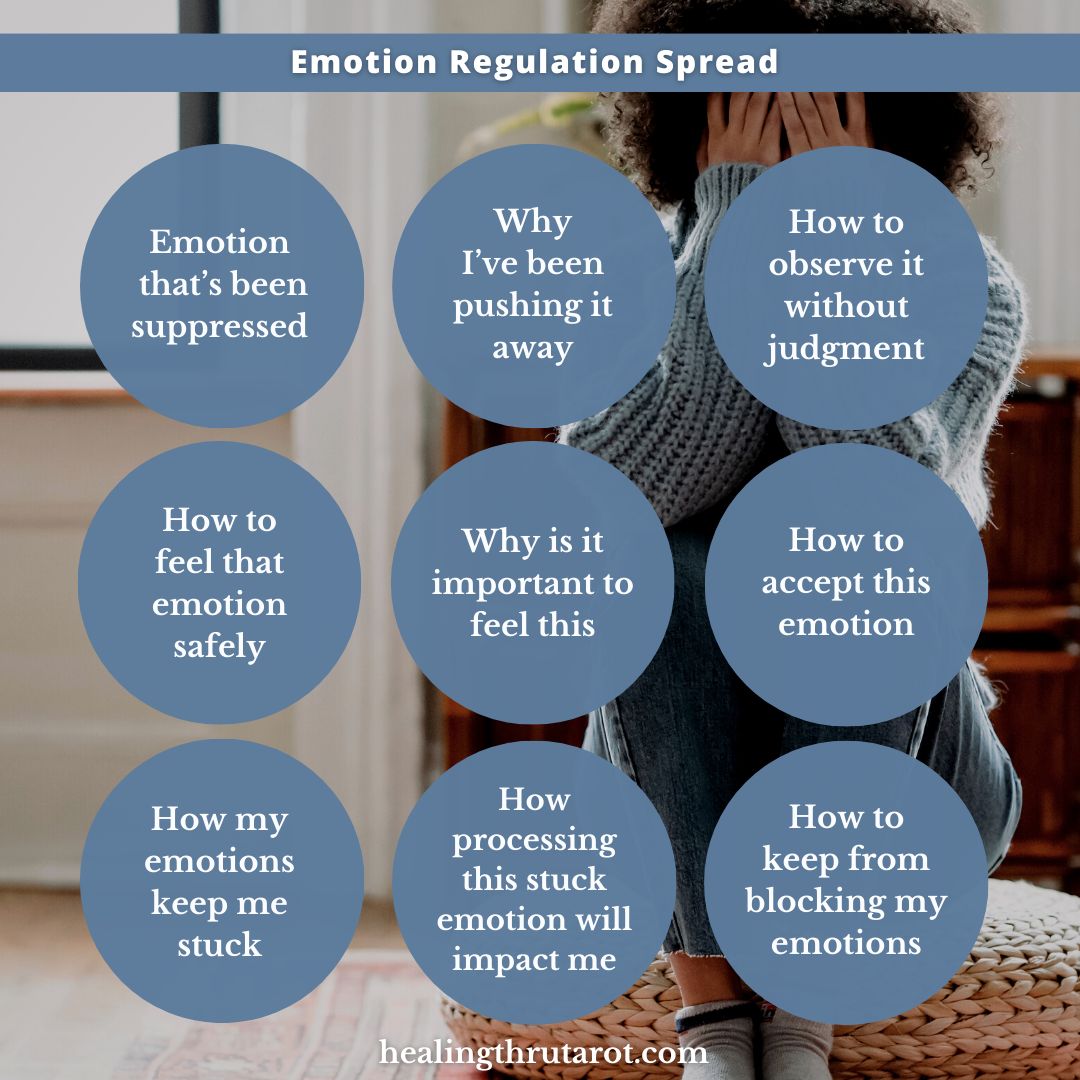
Books and Decks shown in this blog or recommended:
Your Tarot Court, Dame Darcy Mermaid Tarot, Dark Mansion Tarot, The Deviant Moon Tarot, Game of Thrones Tarot, The Light Seers Tarot, Rider Waite Smith Tarot, Way Home Tarot,The Divining Sisters, The Call of the Cards, We Divine Three, The Threads of Fate, The Unbinding
Summer Announcment
I’ll be taking the summer off from podcasting to do some more writing on my book series. In the meantime, check out my fictional divination book series, the Divining Sisters Series, on author.heatherhardison.com - the series is complete in the modern day timeline so it's safe to start the series and binge it! All the details on the book series is below, including the book trailer for the series. Have a great summer cardslingers!
My Novels
Check out The Divining Sisters Series here.

If you're looking for a good witchy book check out my fictional divination book series, The Divining Sisters. Start with book 1 in the series, The Call of the Cards, and then catch up on the rest of the series: book 2, We Divine Three book 3, The Threads of Fate, and book 4, The Unbinding

They're available as eBooks and paperbacks on Amazon. And the eBooks are also on Barnes and Noble, Apple Books, Google Play, Kobo, Scribd, Smash words, and more. The eBooks are just $4.99. Find out more details on my novels on my author website author.heatherhardison.com - where I post updates on book releases, video book trailers, book blurbs and quotes, as well as fun things like my Spotify playlists for each book. I carefully curate those to express the energy of each book.
This series follows a group of women (witches, healers, diviners) who reincarnate lifetime after lifetime and reunite with their coven so they can fulfill a mission of keeping their craft of divination, healing, and magic alive for future generations.
Book Blurb for Book 1: The Call of the Cards
Alexandra Steele, a clinical psychologist, stumbles upon a mystical store in downtown, Memphis, TN, where she encounters tarot cards for the first time. She doesn't realize it at the time, but this simple encounter will leave her life forever changed as she uncovers a world of past life connections to the cards and the craft of divination. This sparks an awakening that opens door after door of a long line of mystic and witch incarnations that run throughout her history. As she reconnects to these deep mystical ties, she begins to learn about her destiny, which is revealed as she starts to encounter coven sisters and foes from previous incarnations. Will her tendency to hide in the shadows and play small continue to hold her back or will the call of the cards lure her onto her destined path of a life full of magic and sisterhood?
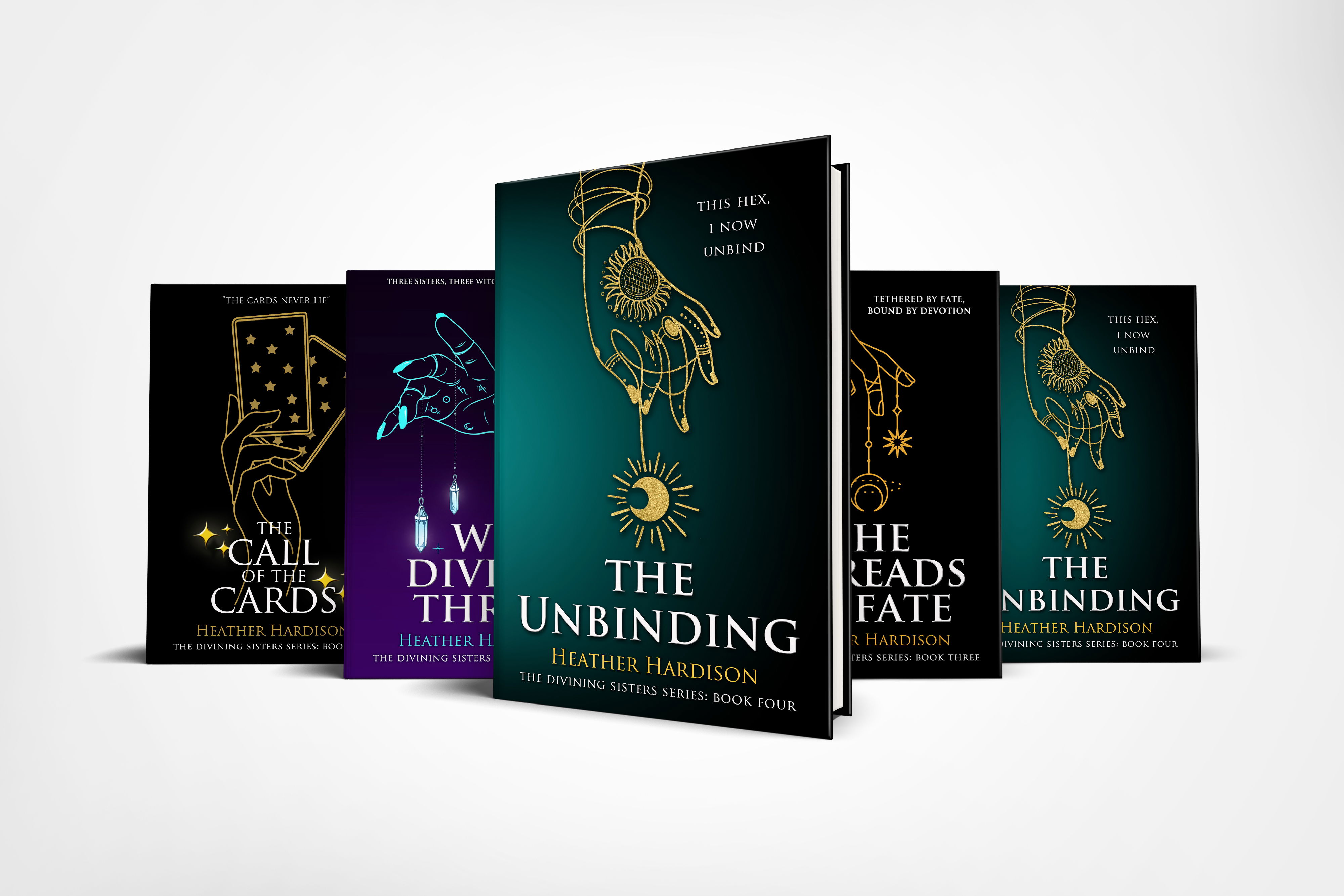
Readers are raving about the series like these 5 star amazon and google play reviews
"Absolutely Unique! Resonated so much!"
"Life-changing. I felt seen. I don't think I've had this experience with any other book."
“The metaphysical series I've been waiting for! I was hooked from the beginning and even found myself slowing down because I want it to last. The characters are so relatable and genuine, and the explanations of tarot readings and past life stories is spot on! I'm eagerly awaiting the next ones. Please please, Heather, keep writing.”
Readers call it "Harry Potter for adults."
If you get a copy, please leave a book review on whatever platform you buy it on if you enjoy it. That really helps me out and can help get my book in front of more readers. And if you love it please also review it on goodreads.
If you follow me on Instagram, you’ll see updates on the book releases there. I have 2 instagram accounts My tarot and podcast account - healingthrutarot My author account heatherhardisonauthor
Watch the book trailer for The Divining Sisters Series
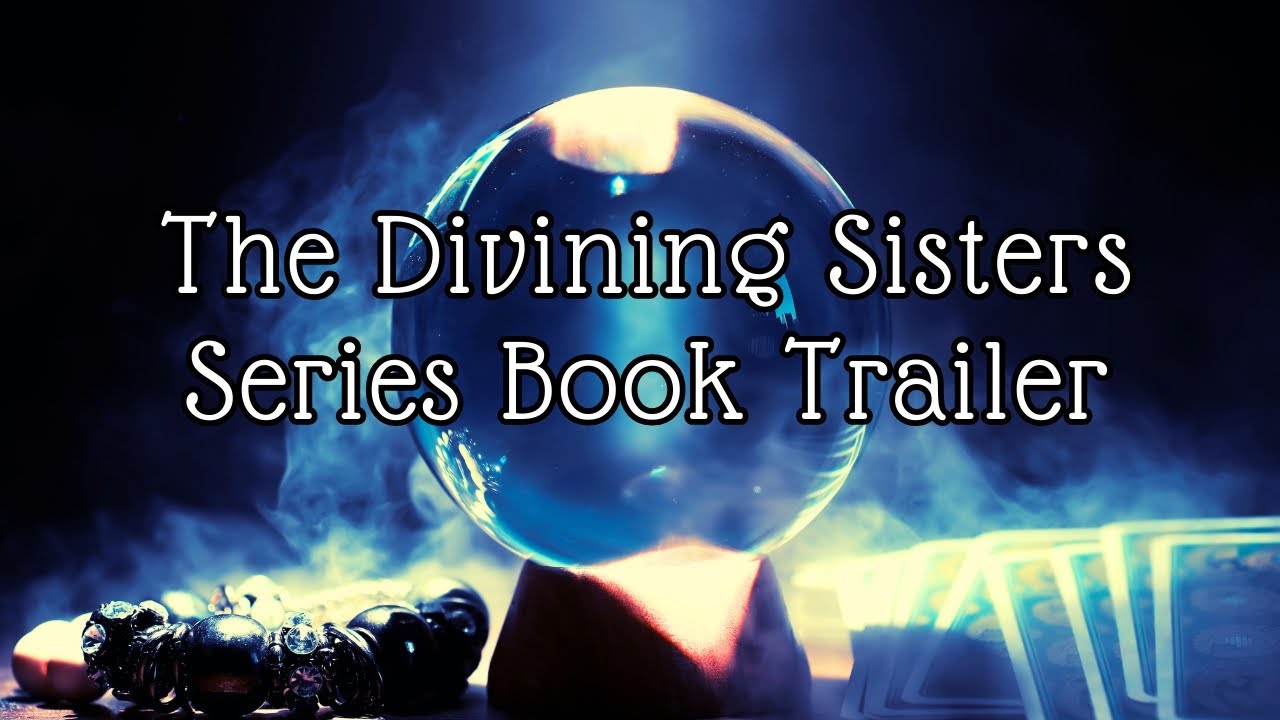
Healing Thru Tarot's Spread Ebook Line

A Spread for All Seasons - 17 custom spreads
Healing and Mental Health Spreads Vol. 1 - 15 custom spreads
Healing and Mental Health Spreads Vol. 2- 15 9-card spreads
Shadow Work Spreads and Workbook - 20 spreads
Healing Thru Tarot’s Life Path and Life Purpose spread ebook includes 15 custom spreads I’ve created to help you identify and align with your life path and sail to success. Spreads like the life path alignment spread, lightwork path guidance spread, conquering obstacles on my path spread, advice from my future self-spread and karmic healing path spread will help you position yourself to step into your full power and achieve the purpose you incarnated to fulfill. Plus many more spreads offering guidance and advice to get on path and stay on track. $12
Click here to purchase any of these spread ebooks

Are you enjoying the Healing Thru Tarot podcast and companion blog? If so, now you can gift me a coffee or two to kept me fueled as I pull all-nighters writing the scripts and recording all the episodes. Help me keep this content flowing by sparking my inspiration! Just click here to gift me a caffeine fix.

tarot divination healing self-healing self-improvement personal development self-growth self-development tarot spreads journey healing thru tarot healing tarot cups court cards tarot court cards rider waite smith tarot your tarot court ethony dawn tarot archetypes emotion regulation spread court cards cups tarot suit page of cups knight of cups queen of cups king of cups